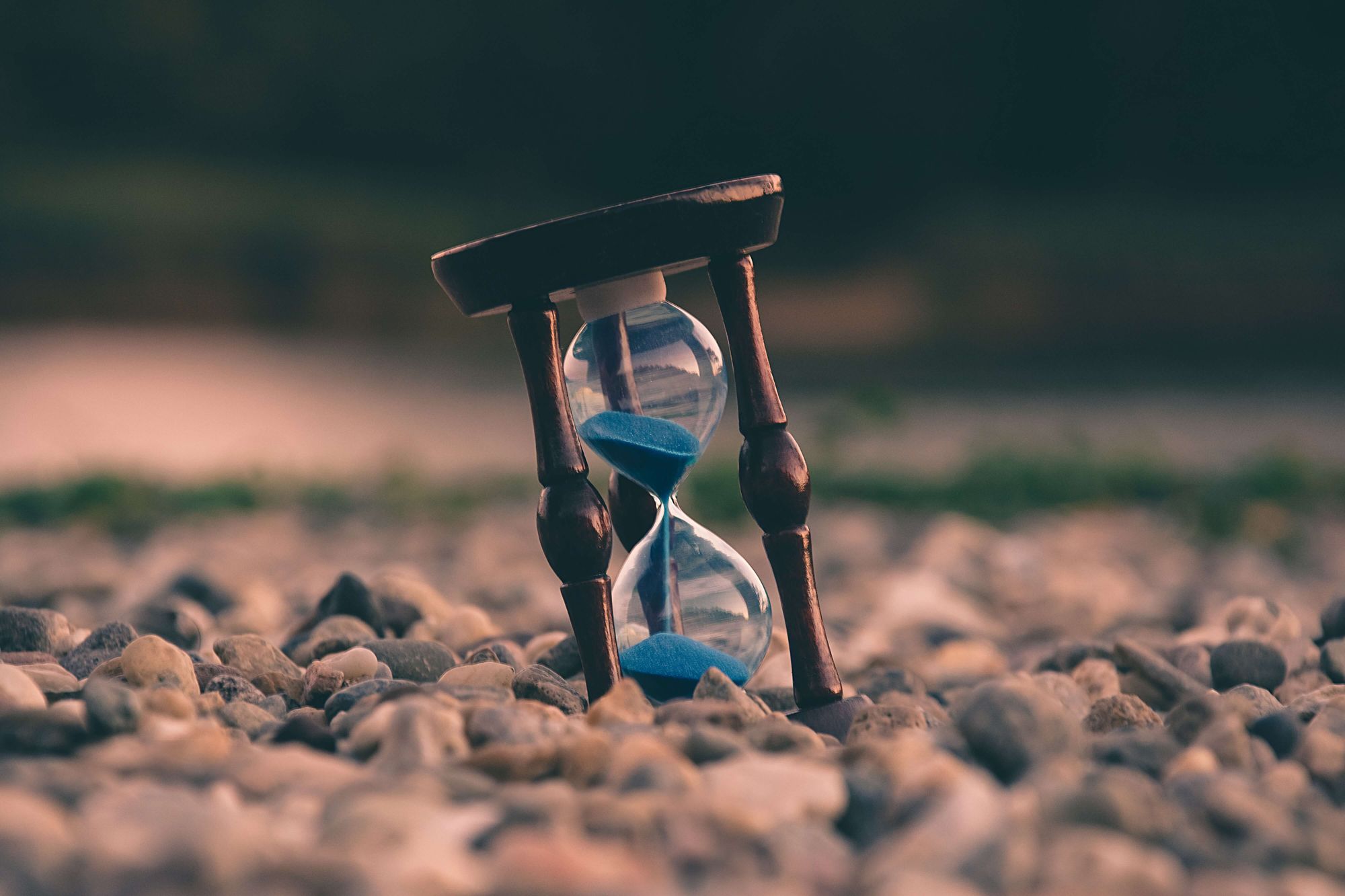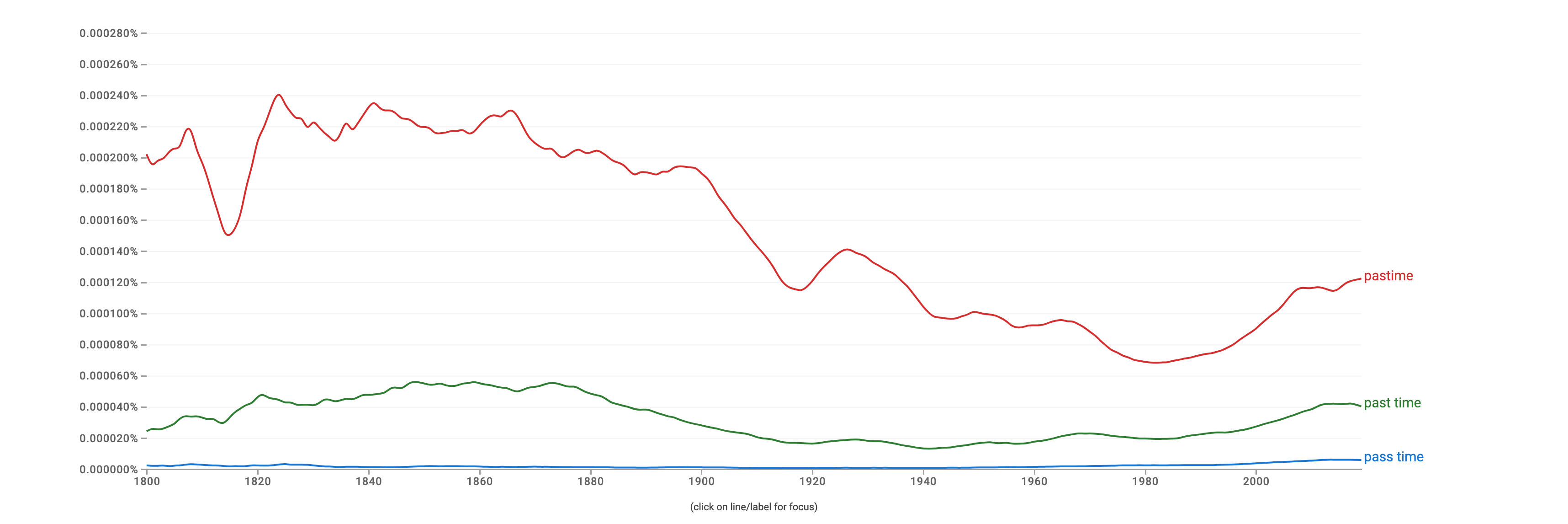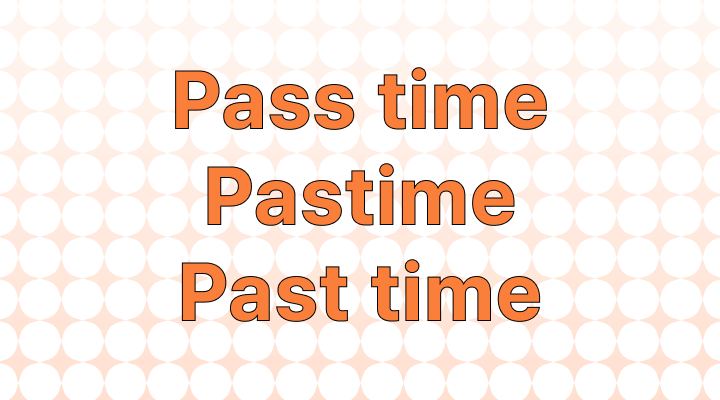- "Pass time" refers to activities or actions that help someone pass or spend their time in a pleasant or entertaining way.
- "Pastime" refers to a hobby.
- "Past time" refers to a period of time that has already occurred or is in the past.
Pass time: "Pass time" in this context refers to John's current activity of engaging in an enjoyable or relaxing pursuit, which is painting landscapes. It indicates how he chooses to spend his free time after completing his work.
Pastime: "Pastime" is used to describe the specific activity John enjoys, which is painting landscapes. It represents his preferred form of entertainment or recreation.
Past time: "Past times" refers to the moments or experiences John is reminiscing about, specifically those spent with friends during college. It signifies a period of time that has already occurred and is now a part of his personal history.
Pass time
Verb phrase: To spend time doing something, especially to occupy oneself or make the time pass more quickly.
Examples:
- I can't wait for the movie to start, there's nothing to pass the time.
- He sat idly by the window, passing the time by doodling on a scrap of paper.
- My favorite way to pass time with friends is playing board games.
Notes:
- "Pass time" is usually followed by a preposition and a gerund ("passing the time by drawing") or an infinitive ("passing the time to wait").
- It can also be used without an object, simply meaning "to spend time": "I passed the afternoon relaxing in the park."
Past time
Phrase: Not a common or standard phrase in contemporary English. However, it can be interpreted in two ways:
- As a combination of adjective and noun: This construction implies something that happened in the past, often referring to a specific period or event.
- Example: We reminisced about past times, recalling our childhood adventures.
- As an idiom meaning "it is overdue": This usage emphasizes that something should have been done earlier than it was.
- Example: It's past time we stopped using single-use plastics for the sake of the environment.
Notes:
- The phrase "past time" is not as readily understood as "pastime" or "a long time ago" and may cause confusion. It's generally recommended to use a clearer alternative.
- When using "past time" as an idiom, it's best to add the introductory phrase "it is" for clarity.
Pastime
Noun: An activity that one enjoys doing in one's free time, especially for amusement or relaxation; a hobby.
Examples:
- My favorite pastime is reading novels before bed.
- Gardening is a relaxing pastime that brings me joy.
- He spends his pastimes hiking, fishing, and camping.
Notes:
- "Pastime" is always spelled with one "s".
- It can be used both with and without the definite article ("the").

Looking at the graph below, we can see the difference in the amount of use between the terms "pastime" and "pass time." From this, we can see that the word "pastime" is used in greater frequency than the phrase "pass time." The former term's use, however, has declined with time.

How do we pronounce pass time, pastime, and past time?
Pass time
In American English, pastime is pronounced pas time.
In British English, pastime is pronounced paas time.
Pastime
In American English, pastime is pronounced pas·time.
In British English, pastime is pronounced paas·time.
Past time
In American English, pastime is pronounced past time.
In British English, pastime is pronounced paast time.
These are just the standard pronunciations, and there may be slight variations depending on regional accents and individual speech patterns.
Example sentences
Pass time:
- During the layover, passengers found various ways to pass time, from browsing shops to enjoying a cup of coffee.
- To pass time on a rainy afternoon, the children decided to build a fort out of blankets and cushions.
- She often used music as a means to pass time during her daily commute, creating playlists for different moods.
- As a hobbyist photographer, he would pass time capturing the beauty of nature through his lens.
- The waiting room had a selection of magazines to help patients pass time before their appointments.
Pastime:
- For many, gardening is not just a chore but a beloved pastime that brings a sense of peace and accomplishment.
- Reading mystery novels became a cherished pastime for Jane, transporting her to different worlds of intrigue.
- In the quiet hours of the evening, painting landscapes became Mark's favorite pastime to unwind.
- For generations, storytelling around the fireplace has been a traditional pastime for the community.
- Collecting rare stamps evolved from a childhood hobby into a lifelong pastime for the avid philatelist.
Past time:
- Browsing through old yearbooks, the friends relived past times filled with laughter and shared experiences.
- The antique clock on the mantle served as a reminder of past times when the family gathered for special occasions.
- In the attic, they discovered a box of letters and photographs, each capturing a piece of their family's past time.
- As the seasons changed, the landscape underwent a transformation, marking the passage of past time.
- The historian dedicated his life to studying the past time of civilizations, unraveling stories from ancient archives.
1. While the movie trailer played, I __ with a sudoku puzzle.
2. My favorite __ is playing board games with friends.
3. It's __ for us to acknowledge the climate crisis and take action.
4. She filled her __ with creative writing, crafting fantastical stories.
5. We reminisced about __ adventures, laughing at childhood memories.
6. __ I spent exploring hidden hiking trails in the mountains.
7. Learning a new language became my __, keeping my mind sharp.
8. Technology has changed how we __ in the modern world.
9. __, communication was slower, relying on letters and telegrams.
10. It's never too late to pick up a new __ and add joy to your life.
Answer Key
- passed the time
- pastime
- past time
- pastime
- past time
- Past time
- pastime
- pass time
- Past times
- pastime
Want to sound like a native speaker?
Engram’s AI-powered grammar checker makes your English sound like a native speaker’s, suggesting natural English expressions on top of fixing grammar, spelling, punctuation, word order, and vocabulary.

References:















